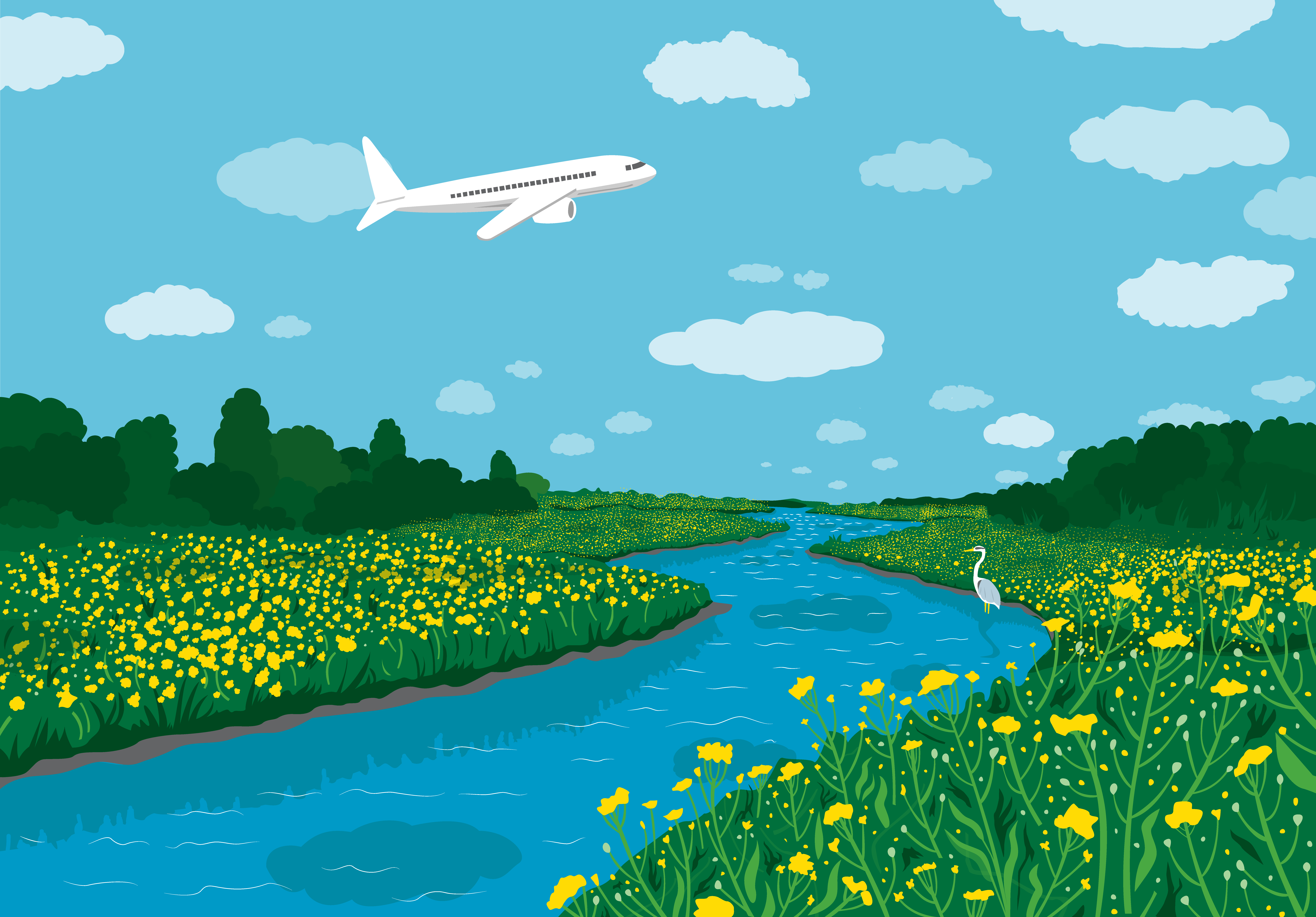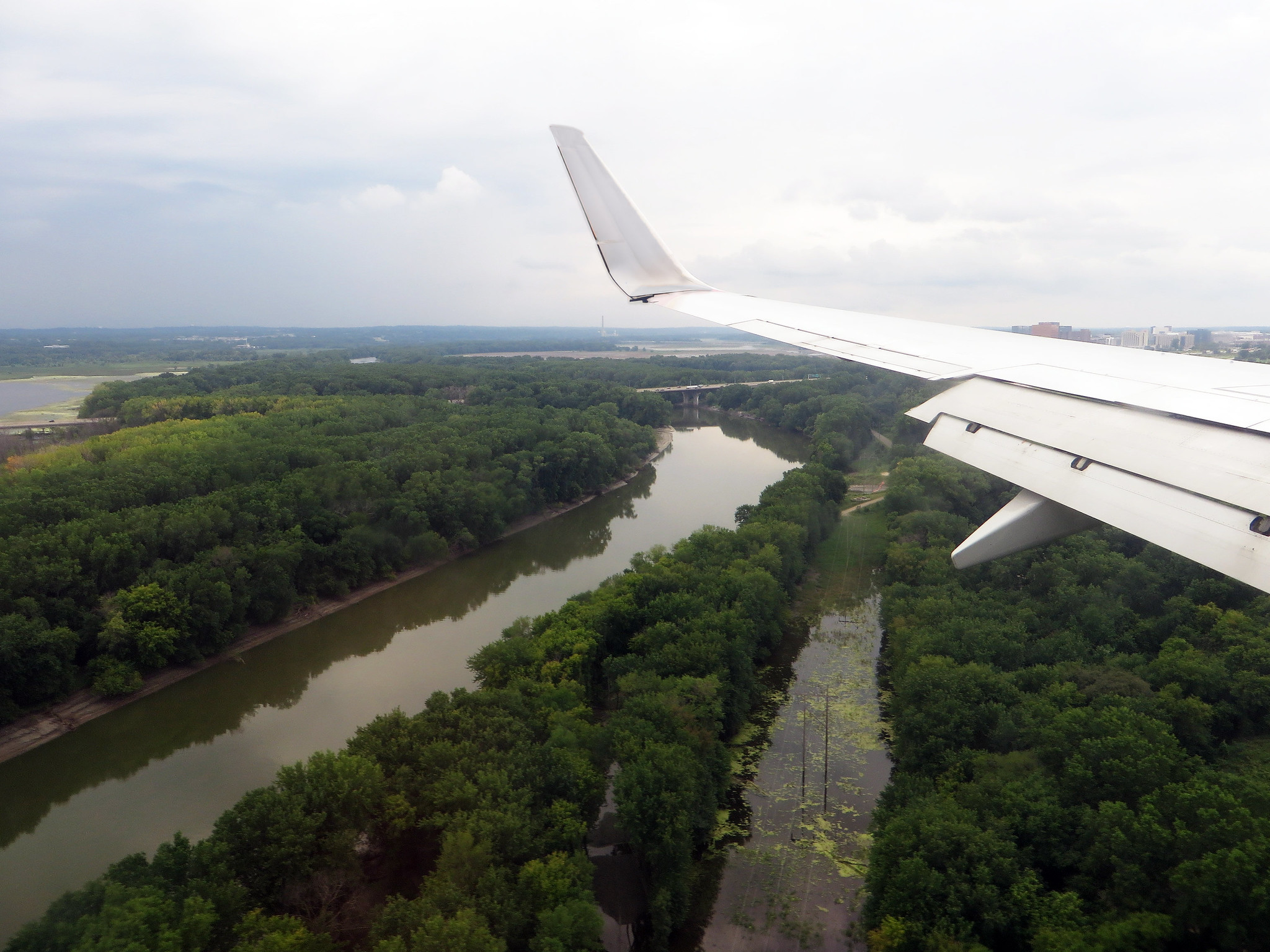Could clean-water crops fuel your flights?

There's great promise for the use of winter oilseeds as sustainable aviation fuel — but there are also challenges. (Image by Kimberly Boustead for FMR)
A version of this article was included in our fall print newsletter. Become a member to receive updates like this in your mailbox.
As our airplane takes off, my 4-year-old peers out the window: "Satellite view!" she exclaims. The land unfolds below us. Cars look like ants, buildings like stones. MSP — the region's second-busiest airport — sits right at the confluence of the Minnesota and Mississippi rivers, twin veins merging in the heart of the cities.
My child presses her nose to the window, wowed by our ascent into the clouds. Watching her triggers the kind of world-made-new wonder I'm often privileged to as a parent. This metal plane, five times longer than a city bus and full of people, can actually fly. But that awe is closely coupled with guilt. Maybe you can relate. Air travel tops the list of worst individual sources of greenhouse gas emissions precisely because it's an almost implausible feat. It requires so much energy that it's not yet feasible to electrify passenger planes like we electrify cars to reduce carbon emissions, and likely won't be for decades. In fact, as efforts to curb carbon take off, air travel might be the most challenging piece of the transportation puzzle to solve.
To me that means we need to fly less. But fortunately, we may also be able to fly better sooner than you might think: The race for greener aviation power is already on. Most airlines, including Delta, are pursuing solutions to achieve zero-carbon air travel by 2050.
Here's the challenge: "Some new lower-carbon jet fuel options — purportedly 'sustainable' ones — could further contaminate our waters and expand the dead zone in the Gulf of Mexico," said FMR Water Program Director Trevor Russell. "Other lower-carbon jet fuel options could actually improve water quality in the Mississippi River."
And that's why Friends of the Mississippi River has landed in the aviation field.
Fueling flight with (the right) plants
Not long after lift-off, the tight urban grid below gives way to an expansive heartland quilt, patches of forest and prairie between acres of farm fields growing soybeans and corn. Much of that corn doesn't end up on people's plates; 40% of it becomes biofuel.
Biofuels could be part of the solution for lower-carbon flight. We've long used corn ethanol to fuel cars. So, naturally, the aviation industry is eyeing corn. But crops like corn can lead to damaging levels of soil and fertilizer in our waters, along with other ecological and societal costs. By some estimates, we'd need as much as three to four times more corn ethanol to power U.S. flight than we use now for cars and trucks. This means more natural areas would be converted to cropland, pushing us further from our vision of clean water for all.
Here's the opportunity: Certain crops can fuel airplanes and protect our waters. Winter oilseed crops (like camelina and pennycress) developed by the U of M Forever Green Initiative are so hardy that Minnesota farmers can grow them from fall to spring, when most fields lie bare and susceptible to erosion. Farmers can harvest them before summer crops get going on those same fields — no new land necessary. And they can sell the tiny, oil-rich seeds to a market eager for more-sustainable jet fuel.
That's not all. Growing winter oilseeds restores soil and keeps pollutants out of our waters. Their production and use would emit much less carbon than other biofuels. Airlines could blend winter oilseed products into fuel mixes right now, no major refitting necessary. So what's the catch?

To fight climate change, we need to fly less, but also fly better. Winter oilseed fuel’s life-cycle carbon emissions are nearly 70% less than typical jet fuel, plus they’re the most river-friendly biofuel. (Photo by Ken Lund)
Plotting a sustainable flight path
This year, Minnesota farmers harvested only around 2,000 acres of winter oilseeds, a drop in the bucket compared to what's needed. But this fall, farmers hope to plant 10 times as much, and this trajectory could continue. That's because FMR and the Forever Green Partnership are working to rapidly increase winter oilseed production to meet potential demand while supporting farmers with these new crops on the ground. "With the right policies and investments, Minnesota could grow enough winter oilseeds on existing farm fields to meet a significant portion of MSP's need for sustainable aviation fuel," Trevor said.
Last year, corporate leaders and other key players formed the Minnesota Sustainable Aviation Fuel Hub — an initiative to transition MSP Airport to sustainable aviation fuels. We're working together with the hub to push this initiative in the right direction. FMR has teamed up with Fresh Energy and The Nature Conservancy to establish environmental and equity principles for sustainable aviation fuels. We need to make sure industry leaders and policymakers commit to investing in lower-carbon, river-friendly options like winter oilseed fuel from the get-go.
All this makes me excited to fly with my child again someday. If we collectively get this right, we'll be able to look out together at even more green in the patchwork below us, and not just during high summer. We'll see natural lands flourishing and established agricultural lands growing new clean-water crops, like the winter oilseeds powering our plane. And when we see the river, the great thread in that heartland quilt, we'll know it's better off too.

Sustainable aviation fuel: How we can get it right
Key guiding principles can steer sustainable aviation away from half-measures or, worse, greenwashing.
Read our full list of principles.
Become a River Guardian
Sign up and we'll email you when important river issues arise. We make it quick and easy to contact decision-makers. River Guardians are also invited to special social hours and other events about legislative and metro river corridor issues.